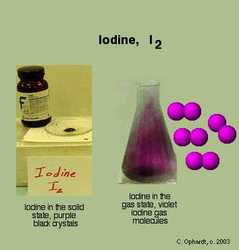Chemical Element
Exporter, supplier, trader, manufacturer, dealer of Chemical Element & Iodine in Mumbai India. Our product range also comprises of Laboratory Chemicals, Speciality Chemicals and Chemical Compound.
Iodine
Iodine is essential to the human body. There is concern that iodine deficiency is a cause of hypertrophy of thyroid and incomplete development. The Japanese generally do not have to worry about iodine deficiency disorder because they regularly consume seaweed. In contrast, people living in the inland regions of Asia, the United States, and Europe use iodine enriched table salt to prevent iodine deficiency disorder.
Iodine and its compounds are primarily used in nutrition, the production of acetic acid and polymers. Iodine’s relatively high atomic number, low toxicity, and ease of attachment to organic compounds have made it a part of many X-ray contrast materials in modern medicine.
Iodine is used in mouthwash, contrast media, and to prevent exposure to radioactive materials. Besides contributing to people’s health, iodine is used in advanced technologies such as LCD polarizers for mobile phones and personal computers and catalysts for chemical products. The application of our products to X-ray luggage inspection at airports has gained us a solid reputation.
Iodine is found on Earth mainly as the highly water-soluble iodide ion I−, which concentrates it in oceans and brine pools. Like the other halogens, free iodine occurs mainly as a diatomic molecule I2, and then only momentarily after being oxidized from iodide by an oxidant like free oxygen. In the universe and on Earth, iodine’s high atomic number makes it a relatively rare element. However, its presence in ocean water has given it a role in biology. It is the heaviest essential element utilized widely by life in biological functions (only tungsten, employed in enzymes by a few species of bacteria, is heavier). Iodine’s rarity in many soils, due to initial low abundance as a crust-element, and also leaching of soluble iodide by rainwater, has led to many deficiency problems in land animals and inland human populations. Iodine deficiency affects about two billion people and is the leading preventable cause of intellectual disabilities.
Iodine is required by higher animals for synthesizing thyroid hormones, which contain the element. Because of this function, radioisotopes of iodine are concentrated in the thyroid gland along with nonradioactive iodine. If inhaled, the radioisotope iodine-131, which has a high fission product yield, concentrates in the thyroid, but is easily remedied with non-radioactive potassium iodide treatment.
Iodine is essential to many forms of life, including human, and is found in thyroid hormones. A lack of iodine in the human body results in a condition known as ‘goitre’ in which the thyroid gland in the neck becomes enlarged. In order to assure an adequate amount of iodine in the diet, table salt is routinely iodized. Iodine is also used as the core commodity in a wide variety of products and in many cases there is no substitute
Iodine is primarily obtained as a by-product with nitrate minerals that are associated with caliche deposits in places such as the Atacama Desert of Chile. It is present in seawater, which contains about 0.05 ppm iodine, meaning that there are approximately 35 million metric tons of iodine in the world’s oceans, but extraction is impractical at these low concentrations. Iodine was first isolated from seaweed, and dried seaweeds, (particularly those of the Liminaria family) contain as much as 0.45 per cent. iodine.
For many of iodine’s uses, there is no comparable substitute. For example, other substances cannot replace its applications in pharmaceuticals, and human and animal nutrition. There are some chemical applications for iodine that can be accomplished using other chemicals. For example, bromine and chlorine can be used in place of iodine for ink and colorant purposes, and for disinfectant purposes.
Chemical Products
- Aluminium Compound
- Ammonium Compound
- Antimony Compound
- Barium Compound
- Bismuth Compound
- Boric Acid
- Cadmium Compound
- Calcium Compound
- Cetramide
- Chemical Compound
- Chemical Element
- Copper Compound
- Cuprous Compound
- Ferric Compound
- Ferrous Compound
- Food Additives
- Gelatinous Substance
- Gum Powder
- Inorganic Compound
- Laboratory Chemicals
- Laboratory Equipment
- Lead Compound
- Lithium Compound
- Manganese Compound
- Magnesium Compound
- Magnesium Metal Turning
- Mercuric Compound
- Micrcoscopy Stains And Solutions
- Natural Oil
- Nickel Compound
- Organic Compound
- Potassium Compound
- Sodium Borohydride
- Speciality Chemicals
- Silver Compound
- Sodium Part I
- Sodium Part II
- Sodium Part III
- Strontium Compound
- Zinc Compound



